

Huracán Sally toca tierra en el sur de EE. UU.
China confirms unauthorised labs were told to destroy early coronavirus samples. “Based on comprehensive research and expert opinion, we decided to temporarily manage the pathogen causing the pneumonia as Class II – highly pathogenic – and imposed biosafety requirements on sample collection, transport and experimental activities, as well as destroying the samples,” he said.

Liu added that this was in line with China’s standard practice for handling highly pathogenic samples, which should not be done by labs that do not meet the requirements. Coronavirus Update Get updates direct to your inbox Class II pathogens can be transmitted among humans or animals, or between humans and animals, and cause serious diseases such as severe acute respiratory syndrome (Sars) and smallpox.
France, India and China Coronavirus Live Coverage. The coronavirus reached France in December, doctors say, rewriting the epidemic’s timeline.
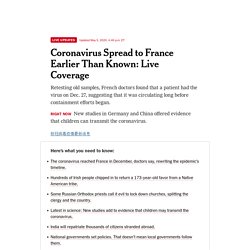
French doctors say they have discovered that a patient treated in late December had the coronavirus — a finding that, if verified, suggests that the virus appeared in Europe nearly a month earlier than previously understood. The finding came this week after doctors tested samples taken from patients in late December and early January. One of those, taken on Dec. 27 from a patient who had pneumonia, tested positive. The Pandemic Isn’t a Black Swan but a Portent of a More Fragile Global System.
Nassim Nicholas Taleb is “irritated,” he told Bloomberg Television on March 31st, whenever the coronavirus pandemic is referred to as a “black swan,” the term he coined for an unpredictable, rare, catastrophic event, in his best-selling 2007 book of that title.
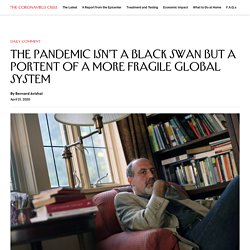
“The Black Swan” was meant to explain why, in a networked world, we need to change business practices and social norms—not, as he recently told me, to provide “a cliché for any bad thing that surprises us.” Besides, the pandemic was wholly predictable—he, like Bill Gates, Laurie Garrett, and others, had predicted it—a white swan if ever there was one. “We issued our warning that, effectively, you should kill it in the egg,” Taleb told Bloomberg. Governments “did not want to spend pennies in January; now they are going to spend trillions.” No evidence coronavirus escaped from Chinese lab. V. 4, n. 1 e 2 (2017)
Don’t Bother Suing China for Coronavirus. There is plenty of blame to go around for the dire personal, social, and economic costs occasioned by the spread of the novel coronavirus, which currently afflicts most countries in the world.

As David Fidler wrote in Just Security last week, the World Health Organization updated the International Health Regulations in 2005 in an attempt to prevent the worst harms from precisely this sort of outbreak. U.S. domestic authorities also prepared plans, including the 2006 National Strategy for Pandemic Influenza promulgated by President George W. Bush and the 2016 Playbook for Early Response to High-Consequence Emerging Infectious Disease Threats developed under President Barack Obama. It seems clear that Chinese authorities failed to adequately report and to contain the spread of this new disease, and that the U.S.
Executive Branch botched its response, with highly predictable and deadly results. Core Allegations. COVID-19 and International Law: Must China Compensate Countries for the Damage? The COVID-19 pandemic is wreaking human, economic, and social damage around the world.
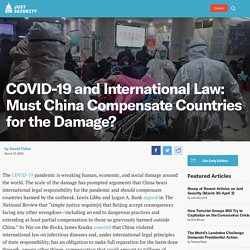
The scale of the damage has prompted arguments that China bears international legal responsibility for the pandemic and should compensate countries harmed by the outbreak. Lewis Libby and Logan A. Rank argued in The National Review that “simple justice require[s] that Beijing accept consequences facing any other wrongdoer—including an end to dangerous practices and extending at least partial compensation to those so grievously harmed outside China.”
In War on the Rocks, James Kraska asserted that China violated international law on infectious diseases and, under international legal principles of state responsibility, has an obligation to make full reparation for the harm done through, among other things, compensation that could amount to trillions of dollars. At least one class action lawsuit against China has been filed in federal court seeking damages suffered from the COVID-19 pandemic. How can we encourage nations to come together to protect the high seas? Members of government, business, and advocacy joined Prospect’s Breakfast discussion supported by High Seas Alliance “Ever since I started talking about environmental issues—ocean, terrestrial, climate—there probably hasn’t been a year when I haven’t said ‘This is the most important year.’

But this really does feel like the defining year,” Zac Goldsmith told a recent Prospect roundtable. From Public International to International Public Law: Translating World Public Opinion into International Public Authority. We use cookies to enhance your experience on our website.By continuing to use our website, you are agreeing to our use of cookies.
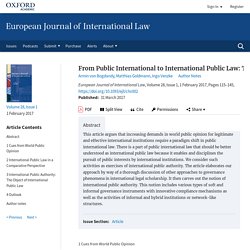
You can change your cookie settings at any time. <a href=" Find out more</a> Skip to Main Content Sign In Register Close Advanced Search Article Navigation. Oxford Public International Law: ESIL 2019 Collection. "The principle of sovereignty, ie of supreme authority within a territory, is a pivotal principle of modern international law.
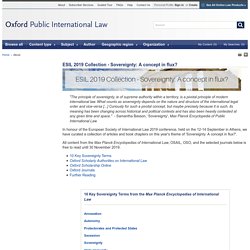
What counts as sovereignty depends on the nature and structure of the international legal order and vice-versa [...] Curiously for such a pivotal concept, but maybe precisely because it is such, its meaning has been changing across historical and political contexts and has also been heavily contested at any given time and space. " - Samantha Besson, 'Sovereignty', Max Planck Encyclopedia of Public International Law In honour of the European Society of International Law 2019 conference, held on the 12-14 September in Athens, we have curated a collection of articles and book chapters on this year's theme of 'Sovereignty: A concept in flux? '. All content from the Max Planck Encyclopedias of International Law, OSAIL, OSO, and the selected journals below is free to read until 30 November 2019.
We hope that you enjoyed this collection. Max Planck Encyclopedias of International Law: The Ultimate International Procedural Law Collection and Quiz. To celebrate the launch of the Max Planck Encyclopedia of International Procedural Law (MPEiPro), we have curated a collection of free articles illuminating the systems and processes through which international law is made, interpreted, and adjudicated in practice.
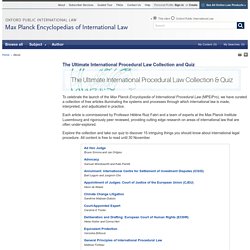
Each article is commissioned by Professor Hélène Ruiz Fabri and a team of experts at the Max Planck Institute Luxembourg and rigorously peer reviewed, providing cutting edge research on areas of international law that are often under-explored. Explore the collection and take our quiz to discover 15 intriguing things you should know about international legal procedure. All content is free to read until 30 November.
We hope that you enjoyed this collection. Subscriptions and 30-day free-trials are available to institutions for all of our resources. Max Planck Encyclopedias of International Law: Oxford Public International Law. The Max Planck Encyclopedias of International Law Welcome to the home of the most trusted reference work in international law, the Max Planck Encyclopedia of Public International Law, as well as the newly-launched Max Planck Encyclopedia of International Procedural Law.
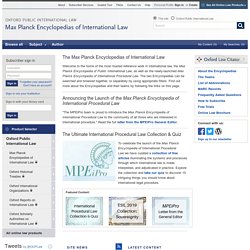
The two Encyclopedias can be searched and browsed together, or separately by using appropriate filters. Max Planck Institute Luxembourg: Max Planck Encyclopedia of International Procedural Law. 000 20191021 PRE 01 00 EN. EJIL: Talk! – The International Court of Justice Releases New Rules of Court. On 21 October 2019 the International Court of Justice released a series of amendments to its Rules of Court.
This is the first substantive change to the Rules since 2005 and marks the fifth time the Rules have been amended since the creation of the Court (discounting the PCIJ years, on which more will be said in a moment). The 2019 amendments are of interest because they come at a time when practical and academic interest in the Court’s procedure is at an all-time high. I say this not only because it is the focus of my own PhD research. Online Disinformation and Political Discourse: Applying a Human Rights Framework.
EJIL: Talk! – Goal-setting in an era of mass extinction: a planetary boundary for biosphere integrity in international biodiversity law? (Part I) Introduction. EJIL: Talk! – Reforming the World in Our Own Image: A Critique of Liberal Constitutionalism. Over the contest hovers, as in all ages, a concept of society formulated and fostered by intellectuals. This is not a reflection of reality, but a goal and hope of good men.P.E.Corbett, Law and Society in the Relations of States (1951) The conviction in a linear teleology of progress is fundamental to modernity – and to liberal democracy, its exemplary political formation.
The supposition is that history has a telos, and that telos is liberalism. EJIL: Talk! – To Reform the World: International Organizations and the Making of Modern States – A Reply to the Discussants. EJIL: Talk! – Beyond “Good Neighborliness” in the ICJ 1 October 2018 Judgment in Bolivia v. Chile: Do Human Rights and Sustainable Development Obligate Creating Negotiated Access for Landlocked Bolivia to the Pacific Ocean? On 1 October 2018, the International Court of Justice issued its Judgment on the Merits in Obligation to Negotiate Access to the Pacific Ocean (Bolivia v. Chile), finding, by 12 votes to 3, that Chile “did not undertake a legal obligation to negotiate sovereign access to the Pacific Ocean” for Bolivia and rejecting all other submissions of Bolivia.